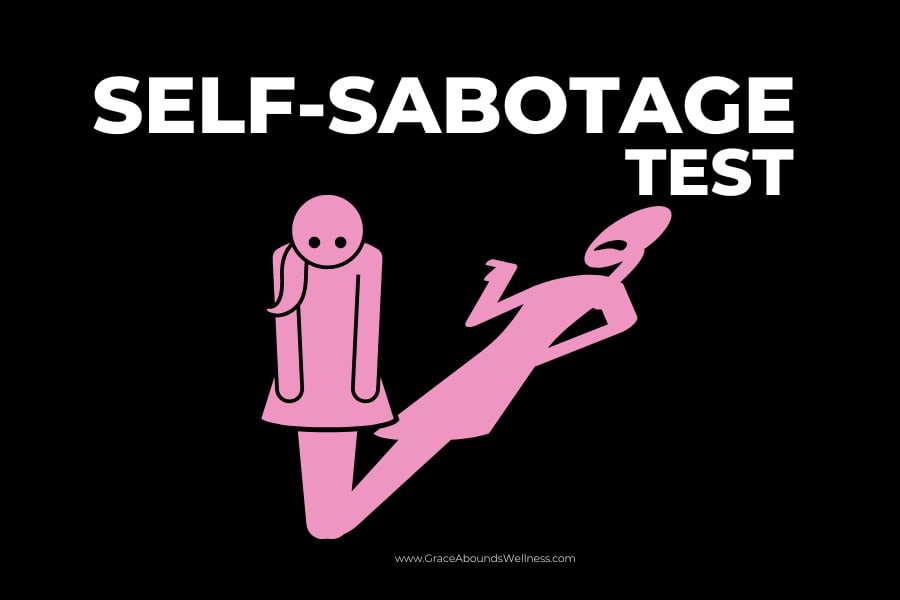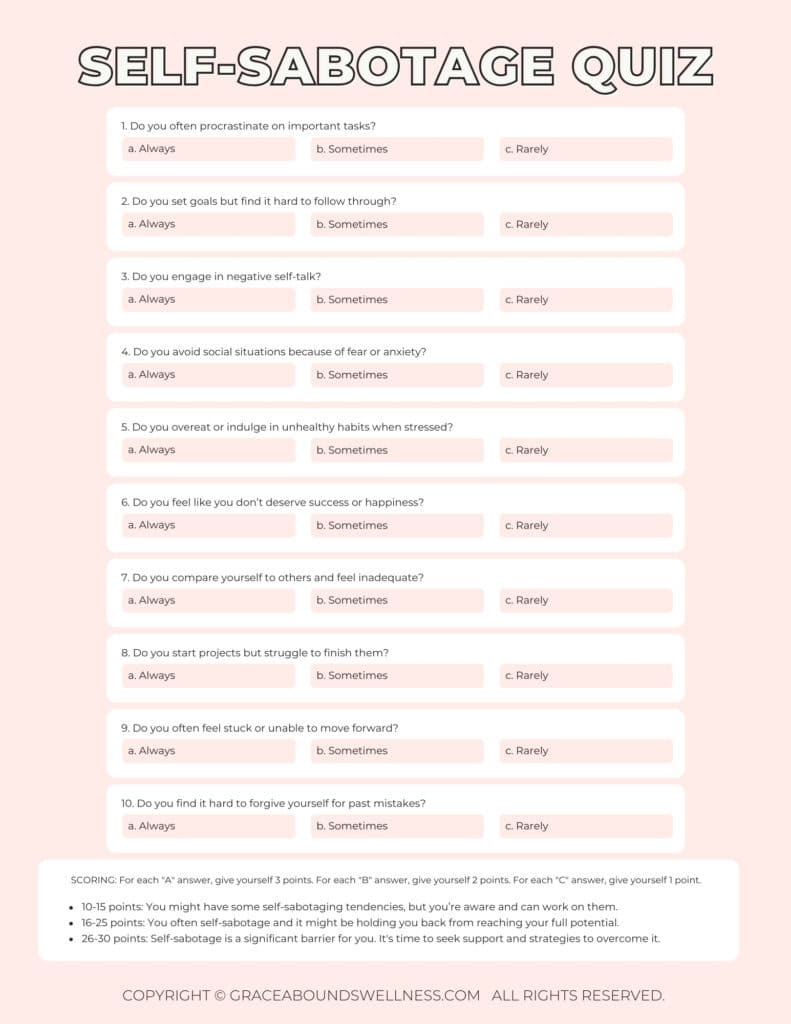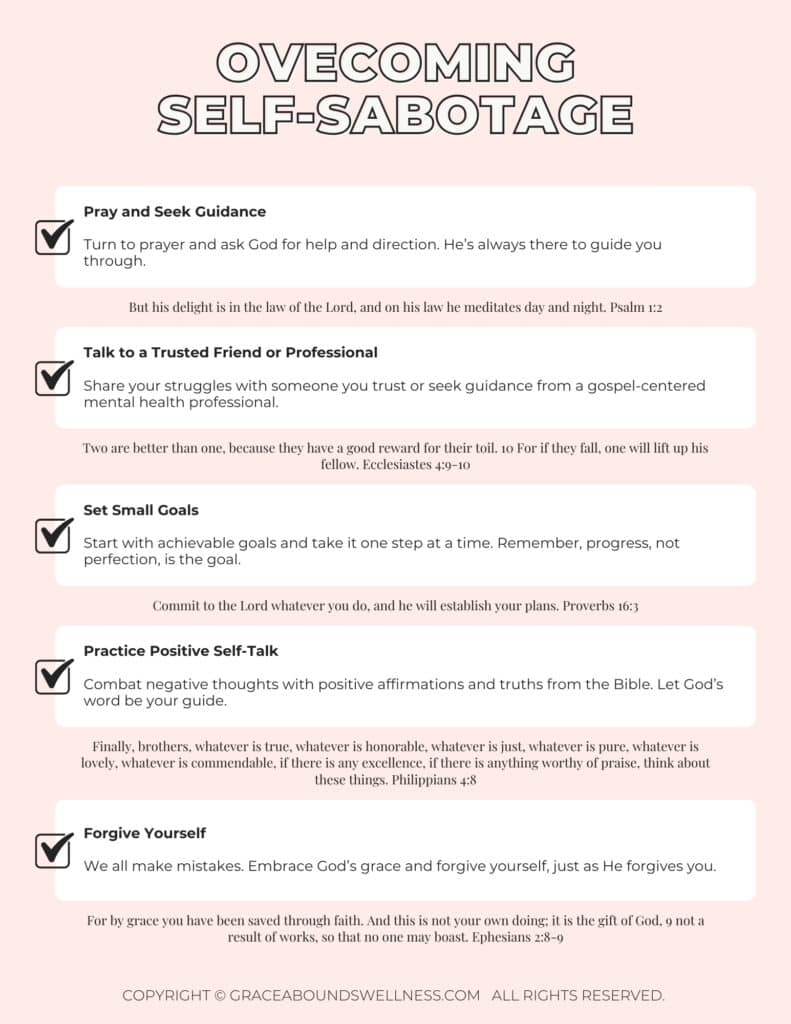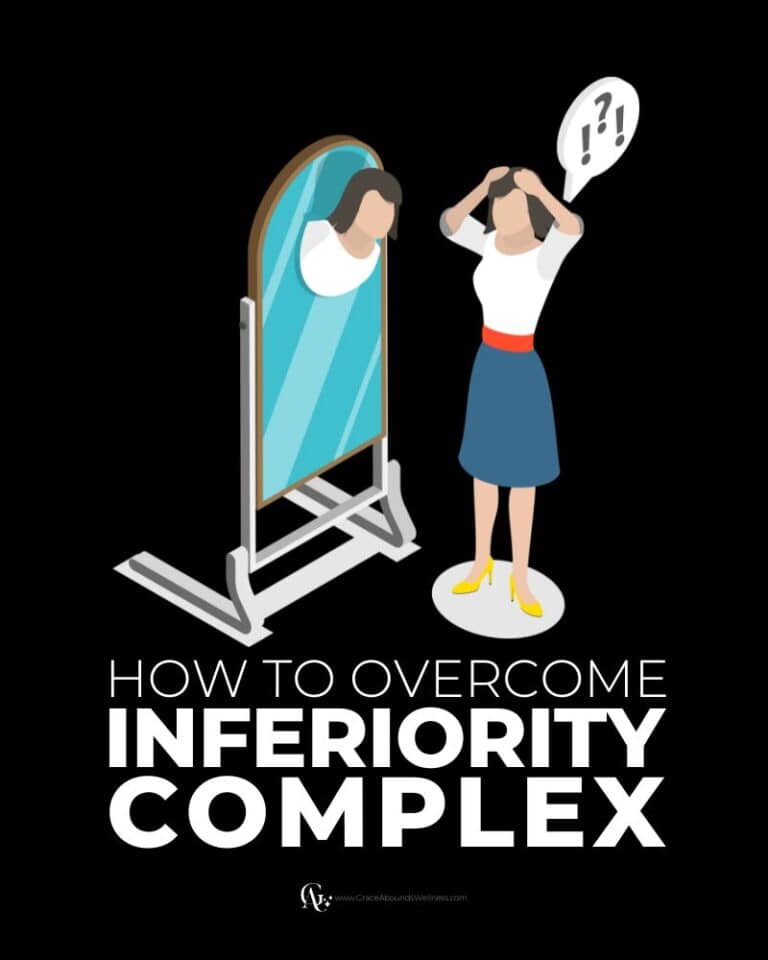Take This Self-Sabotage Test & Learn All About It!
In this post, I’m giving you a self-sabotage test so you can find out if you’re sabotaging yourself. And so you can actually do something about it!
Heads up! This post may contain affiliate links, which means I get a small commission if you make a purchase — at no extra cost to you. I only recommend products I love and trust! Read my full disclosure here.

Imagine this…
The new year is coming up. You set your infamous New Year resolutions — overcome your body image struggles, eat more nourishing foods, invest in better relationships, or work toward deeper spiritual growth — and by the second week of January, you’re back to your old ways. (ugggh, been there 🙋🏻♀️)
And you’re left feeling frustrated, guilty, ashamed, defeated _______________ (fill in the blank)…
(More about these feelings later.)
So why are you getting in your own way?
And why do SO many other Christian women struggle with self-sabotage — especially when it comes to body issues?
Well, read on because today you’ll learn all about self-sabotage…
From what it looks like and how to recognize it in your daily life to how it negatively affects your life. PLUS, I’ve got a simple 10-question self-sabotage test to help you see if you’re unknowingly practicing any of the defining destructive behaviors. Overcoming self-sabotage is possible, my beautiful friend!
Let’s dive in!
What is Self-Sabotage?
Self-sabotage is when you do things that block your own success and well-being.
It’s like carrying a backpack full of rocks while trying to climb a mountain. You might have great goals, but your actions don’t match up.
And the thing about this self-defeating behavior is that it doesn’t discriminate! It can show its ugly face in your professional life — and it can sneak into EVERY other aspect of your life…
What Does It Mean to Self-Sabotage?
When you self-sabotage, you might…
- set personal goals but not follow through.
- feel stuck in negative emotions.
- make things harder for yourself.
- act in ways that don’t align with your values.
What Does Self-Sabotaging Look Like?
According to experts, procrastination is the most common self-sabotaging behavior. Procrastination leads you to put off important tasks to avoid negative emotions like anxiety or fear of failure.
While procrastination temporarily relieves these uncomfortable feelings, it ultimately prevents you from achieving your long-term goals and personal success (no bueno…).
And if you’ve been self-sabotaging for quite some time, your self-sabotaging behaviors can seem like “common behavior.” So you might have a hard time identifying this negative behavior on your own. But no worries, I’m here to help guide you 😉.
19 Examples of Common Self-Sabotaging Behavior
Here are some clear and identifiable examples of self-sabotaging habits…
- Procrastinating on important tasks.
- Entertaining negative self-talk.
- Overeating when you’re stressed out.
- Avoiding social situations out of fear.
- Being a perfectionist.
- Constantly doubting your abilities and potential.
- Setting unrealistic expectations for yourself.
- Consistently being late.
- Ignoring your physical, emotional, and spiritual needs.
- Overcommitting and then feeling overwhelmed.
- Avoiding conflicts and not standing up for yourself.
- Sabotaging relationships due to fear of intimacy.
- Engaging in unhealthy habits like excessive social media.
- Engaging in self-destructive behavior like substance abuse.
- Putting off exercise or healthy eating habits.
- Self-sabotaging career opportunities by not applying for promotions.
- Choosing toxic relationships over healthy ones.
- Overspending or mismanaging finances.
- Staying in a comfort zone instead of pursuing personal growth opportunities.
Did any of these examples stand out or seem familiar?
The next time you notice yourself sabotaging, take a moment to think about why you’re doing it.
What are you feeling — sad, angry, afraid…?
Once you’ve identified the feeling behind it, you can pray about it and ask God to help you overcome that feeling 😊.
(Read on because I have more tips on how to overcome self-sabotage below!)
Overcome Your Body Image Struggles…
Download your FREE 18-page “Body Image Redefined Fast Track” so you can begin your life-transforming journey toward self-acceptance and embrace your identity as a cherished daughter of God TODAY!

What is Self-Sabotaging a Symptom Of?
Self-sabotage is often rooted in…
- low self-esteem.
- fear of failure.
- fear of success.
- fear of change.
- negative past experience.
- childhood trauma.
- feeling unworthy of success.
How Does Self-Sabotaging Affect Relationships?
Self-sabotaging can deeply impact your relationships with others, whether they’re romantic relationships, intimate relationships, or with family members.
It stops you from reaching your fullest potential — all that God designed you to be — and from forming healthy relationships.
Romantic Relationships
When it comes to romantic relationships, self-sabotage often comes from having low self-esteem, fear of failure, or fear of letting people see your vulnerable side.
This can lead to…
- Trust Issues and Miscommunication: You might not trust your other half or talk openly, which can get in the way of a good relationship. For example, you might constantly second-guess his intentions or withdraw emotionally, which can prevent a great relationship from thriving.
- Fear of Getting Close: Being afraid of getting hurt might make you avoid getting too close emotionally. Which can cause your relationship to lack depth and genuine emotional bonding.
💖 Explore Related Posts 💖
- The Power of Grace: How to Overcome Self-Sabotage Through a Christian Perspective
- The Power of Strength Training: From Self-Sabotage to Self-Love
- What is Neuroplasticity and How To Renew Your Mind
Intimate Relationships
For intimate relationships, being open and trusting is particularly important!
Self-sabotaging can get in the way by…
- Creating Emotional Barriers: Negative self-talk or setting unrealistic standards can create emotional distance from your significant other. Which makes it difficult to build a deep connection with him.
- Fear of Commitment: If you’re afraid to commit, you might push away loved ones. It can make you miss out on enjoying the benefits of a stable, supportive, and intimate relationship.
Family Members
Sadly, self-sabotage can mess with family relationships too.
For example…
- Avoiding Confrontation: Instead of dealing with issues head-on, you might ignore them, making things worse over time.
- Blaming Others (Projecting Insecurities): Sometimes, you might blame someone in your family for your own insecurities. This can cause misunderstandings, tense situations, and emotional pain. And it can also make it hard to work through life’s everyday challenges together.
Reaching Your Fullest Potential
Reaching your fullest potential in relationships can be tough when self-sabotage gets in the way, like…
- Wasting Too Much Time Feeling Down: Dwelling on self-doubt and fears consumes the time and energy that could be used to build better relationships and grow as a person.
- Undermining Hard Work: Even if you’re working hard, self-sabotage can make it feel like you’re not getting anywhere. Things like, procrastination or perfectionism can slow down progress in both your personal and professional life.
And again — you’re left feeling all of these negative feelings…
💖 Recommended Resources 💖
Check out all of the FREE Body Image Related Resources here!
Don’t allow these feelings to disrupt your life.
Let’s talk about feelings…
You know the ones – frustration, guilt, shame, regret, and ________________.
Yeah, they’re tough to deal with, especially when they start creeping in after yet another quote-unquote failure.
👉 You might feel frustrated…
Like you’re hitting a huge brick wall every time you try to move forward. It’s like no matter how much you want to follow through, it feels impossible to reach your goals.
👉 And then there’s that cruel guilt weighing on your heart…
Whispering to your ear that you should’ve done better, that you should’ve tried harder.
👉 Shame?
Oooh, shame is a tough one. It’s that sinking feeling in your stomach when you realize you’ve let yourself down —AGAIN. You might even feel like you’re not worthy of success or love because of your slip-ups.
But please, allow me to take this moment to disrupt your negative thoughts and remind you something — you’re always worthy.
Why?
Because your actions don’t define you. You are God’s precious daughter PERIOD – End👏of👏Story.
And then there’s regret…
That lingering sense of disappointment and hope for a do-over. You wish you could turn back time and make different choices, but you can’t. All you can do is learn from the past, give yourself some grace, and keep moving forward with God’s help.
But here’s the thing my beautiful friend — you don’t have to let these feelings dictate your life. In Christ, you’re stronger than you know, and like we said a moment ago — these setbacks don’t define you 😉.
So the next time you feel bad about yourself — take a deep breath and remember that it’s okay to ungraciously stumble along the way. It’s all part of the journey to becoming the incredible woman you’re meant to be. So dust yourself off — in Christ, you’ve got this 💖.
Ready to take the self-sabotage test?
How Do You Know If You’re Sabotaging Yourself?
Take this simple 10-question self-sabotage test to find out if you’re sabotaging yourself.
Self-Sabotage Test
(Download your self-sabotage test and checklist pdf here.)
Instructions: Read each question and choose the answer that best describes you. At the end, I’ll show you how to score your quiz.
- Do you often procrastinate on important tasks?
- A) Always
- B) Sometimes
- C) Rarely
- Do you set goals but find it hard to follow through?
- A) Always
- B) Sometimes
- C) Rarely
- Do you engage in negative self-talk?
- A) Always
- B) Sometimes
- C) Rarely
- Do you avoid social situations because of fear or anxiety?
- A) Always
- B) Sometimes
- C) Rarely
- Do you overeat or indulge in unhealthy habits when stressed?
- A) Always
- B) Sometimes
- C) Rarely
- Do you feel like you don’t deserve success or happiness?
- A) Always
- B) Sometimes
- C) Rarely
- Do you compare yourself to others and feel inadequate?
- A) Always
- B) Sometimes
- C) Rarely
- Do you start projects but struggle to finish them?
- A) Always
- B) Sometimes
- C) Rarely
- Do you often feel stuck or unable to move forward?
- A) Always
- B) Sometimes
- C) Rarely
- Do you find it hard to forgive yourself for past mistakes?
- A) Always
- B) Sometimes
- C) Rarely

How to Score the Test
- For each “A” answer, give yourself 3 points.
- For each “B” answer, give yourself 2 points.
- For each “C” answer, give yourself 1 point.
Total Your Score
- 10-15 points: You might have some self-sabotaging tendencies, but you’re aware and can work on them.
- 16-25 points: You often self-sabotage and it might be holding you back from reaching your full potential.
- 26-30 points: Self-sabotage is a significant barrier for you. It’s time to seek support and strategies to overcome it.
If you scored high, don’t worry. The first step to change is awareness!
And the good news is I’m here to help you through it 😊.
Next Steps…
Start with any one of the simple but powerful tips of this “Overcoming Self-Sabotage Checklist…”
(Download your self-sabotage test and checklist pdf here.)
✅ Pray and Seek Guidance: Turn to prayer and ask God for help and direction. He’s always there to guide you through. Psalm 1:2
✅ Talk to a Trusted Friend or Professional: Share your struggles with someone you trust or seek guidance from a gospel-centered mental health professional. Ecclesiastes 4:9-10
✅ Set Small Goals: Start with achievable goals and take it one step at a time. Remember, progress, not perfection, is the goal. Proverbs 16:3 Commit to the Lord whatever you do, and he will establish your plans.
✅ Practice Positive Self-Talk: Combat negative thoughts with positive affirmations and truths from the Bible. Let God’s word be your guide. Philippians 4:8
✅ Forgive Yourself: We all make mistakes. Embrace God’s grace and forgive yourself, just as He forgives you. Ephesians 2:8-9

Bookmark this page for easy access whenever you need a reminder or some encouragement along the way.
You’ve got this, beautiful! Remember, you’re capable of incredible things, and with God by your side, there’s nothing you can’t overcome. 💖
My prayer for you is that my decades of experience with — an all-consuming battle with distorted body image — and self-worth struggles — and how God has radically worked on my heart will bless and inspire you!
You’re Invited…
You have an open invitation to binge on all of my posts — written with Holy Spirit-inspired words and filled with love just for you — my beautiful friend.
If you love this content and want to be the first to know of the best in grace-first wellness, scroll to the bottom and subscribe to The Grace Abounds Collective newsletter.
Sharing is caring! Share this post with someone who needs the life-transforming grace and love of Jesus. It’s super easy! Just tap any of the share buttons — to the left on your screen.
Thank you for joining me on this journey. You are loved, precious, and wonderfully made.







Join the List
Stay up to date & receive the latest posts in your inbox.